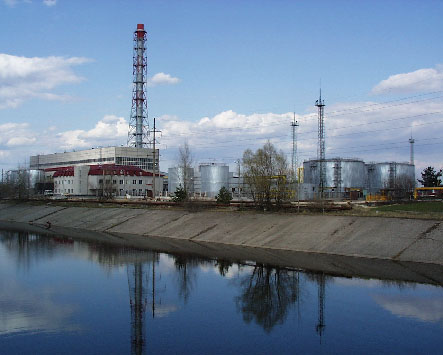
| October - December 2001 Contents Highlight |
Armenia Bulgaria Czech Republic Hungary |
Kazakhstan Lithuania Russia Slovakia |
Ukraine United States Cross-Cutting Activities Planned Activities |
Highlight
Ukrainian authorities officially turn heat plant over to Chornobyl NPP for operation
The Chornobyl heat plant was turned over to the Chornobyl nuclear power plant (NPP) after Ukrainian authorities signed the official commissioning report. However a few final commissioning activities are still under way. Mr. Hartley, PNNL's Senior Project Manager, and Mr. Bogdanov, of the Project Construction Management Group (PCMG), met in December to discuss the status of the heat plant commissioning.
All hot water boilers and three steam boilers had been commissioned on natural gas. Final comprehensive testing was under way on the last steam boiler, # 6. After the remaining steam boiler is commissioned, all boilers will be tested on the back-up fuel, Mazute. This is planned for early January 2002 during required "cold-weather" testing.
PNNL staff also toured the heat plant site and met with management of the Startup & Adjustment General Contractor and the General Contractor to review the completion of their subcontracts. They are essentially complete (with one remaining milestone payment due) and will warranty their work for the next year as a condition for Chornobyl NPP signing off on their final payment request. (Jim Hartley, PNNL, 509-372-4428; Riaz Awan, NNSA, 380-44-490-4485)

Chornobyl Heat Plant officially turned over to Chornobyl NPP for operation
GRS presents review results on South Ukraine PRA
South Ukraine Nuclear Power Plant's (NPP) Unit 1 level 1 internal event probabilistic
risk assessment (PRA) sponsored by NNSA was peer reviewed separately by Gesellschaft
fur Anlangen und Reaktorsicherheit mbH (GRS) of Germany and by Engineering Technologies
and Developments (ETD) of the Ukraine. The GRS peer review findings for South
Ukraine NPP were presented at meetings held on December 13 and 14 in Berlin.
GRS performed a vertical slice review, looking at a single accident sequence.
ETD's in-depth review covered all aspects of the PRA. Only through the scrutiny
of a peer review could presumptions about the adequacy of procedures be questioned
and brought to the attention of the power plant staff.
South Ukraine NPP Unit 1 is of the oldest VVER-1000 design, lacking redundancy in safety systems and therefore requiring many independent operator actions. The high-pressure injection system, unlike that at newer plants such as Zaporizhzhya, cannot operate off the plant sump. In addition, there is a pressure gap between 18 and 40 bar at which neither the high-pressure nor the low-pressure safety injection systems can function.
A key outcome of the GRS and ETD reviews was the identification of the ambiguity of operator actions during a small, uncompensated loss of coolant accident (LOCA). Existing procedures for this type of event would allow the operators to choose one of two different procedures - 1) a procedure to cool the primary system at 30oC/hour, or 2) a procedure to cool at 60oC/hour. One of these two choices would result in core damage!
Based on this peer review finding, Sergey Krasnukha (South Ukraine NPP) informed
meeting attendants that upon his return to the power plant he would immediately
ensure that the operators know which is the correct procedure to use when there
is a small, uncompensated leak in the primary system. Sergey Krasnukha announced
that, based on the findings of the PRA and the peer review process, the South
Ukraine plant now has plans to correct these deficiencies. As a direct result
of the NNSA program for PRAs and peer reviews, South Ukraine Nuclear Power Plant
is operating more safely today than it did before these reviews. (Mark Petri,
ANL, 630-252-3719; Walt Pasedag, NNSA, 301-903-3628)
| October - December 2001 Contents Highlight |
Armenia Bulgaria Czech Republic Hungary |
Kazakhstan Lithuania Russia Slovakia |
Ukraine United States Cross-Cutting Activities Planned Activities |